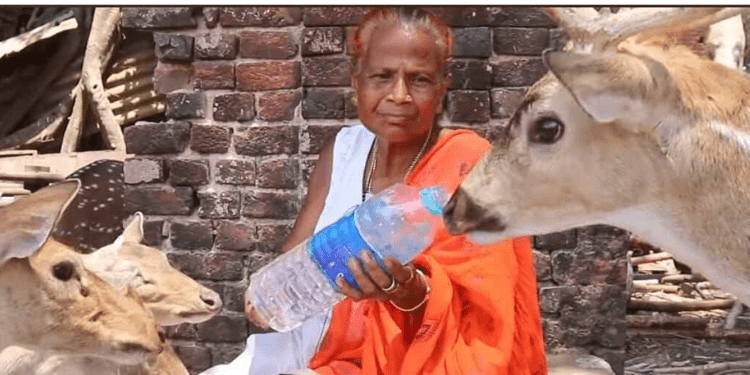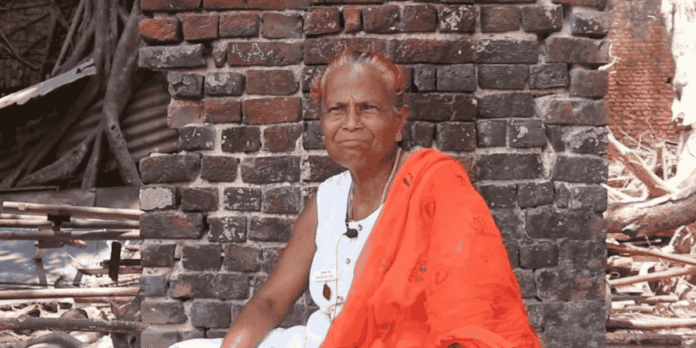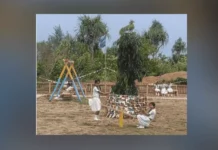By Shradha M
In the early 1990s, the British introduced deer to the Andaman and Nicobar Islands for recreational hunting. After their departure, the deer population grew significantly, impacting local ecosystems. Despite being classified as an invasive species in the region, the Wildlife (Protection) Act of 1972 prioritizes the preservation of all wildlife, protecting species from hunting and habitat loss. Netaji Subhash Chandra Bose Island, formerly known as Ross Island, where the British once established a penal colony, is now home to these deer and other wildlife.
Today, this island is a peaceful blend of history and nature, where old ruins and thriving wildlife tell a story of survival and care. At the center of this remarkable evolution is Anuradha Rao, a tourist guide and deer guardian, who has dedicated over 25 years to protecting and nurturing the island’s deer population.
Her ancestors were brought to the Andamans as prisoners. When she was just five, she began visiting Ross Island. Her connection to the island deepened as she saw firsthand the threats to its deer. In the early years of her work, Rao witnessed how poaching, habitat degradation, and neglect had pushed these animals to the brink. “We used to feed them leaves as kids,” she says. “But over time, they disappeared. They were being hunted openly.”
In 1987, the Indian Defence Forces took control of the island and introduced protection measures, setting up food supply stations, surveillance, and patrols. “That’s when things started to change, and hunting stopped within a year,” she recalled.
In recent years, nearly 500 deer roam the island—a remarkable turnaround made possible by the sustained collaboration between Defence personnel and Anuradha’s unwavering dedication. Day after day, she arrives with sacks of fresh vegetables and yeast-free bread for the deer.
“Every rupee I earn goes to them. I keep just enough for my auto fare. When I run short, I borrow from my sisters,” she says.
She has even named the deer, and they’ve learned to recognize their names over the years. “When I call, they come running down like leaves rolling from a hill.”

Anuradha’s persistent efforts and gentle approach have gradually helped the deer overcome their fear of humans. Once cautious and timid, they now approach tourists with ease and trust. “Earlier, they would hide in the woods at the sound of footsteps. Now, when tourists come, they’re greeted by deer walking right up to them, unafraid and curious. It’s a bond that took years to build,” she says.
Her compassion extends beyond just deer. “When I call the peacocks or squirrels, they come. I don’t disturb anyone. I share my tiffin with them. One squirrel comes to eat from it,” she shares, highlighting her gentle rapport with the island’s entire ecosystem.
Anuradha has also developed a deep understanding of natural signs and wildlife behavior. “Whenever a peacock makes a rooster-like call, it’s a sign that a large tree is about to fall,” she explains. “The animals know this instinctively and move away.” She recalls one such moment vividly: “I heard the sound and spotted the peacock making that call. Within minutes, the entire area was silent—no animals in sight. And then, several trees came crashing down. Not a single animal was harmed.”
This intuitive connection between animals and nature, she believes, is a lesson in awareness. “The deer respond to the peacock’s warning. They listen and move. It’s nature’s silent language, but one we’ve forgotten to hear.”
She once received a prestigious job offer from abroad but graciously turned it down, stating that her calling lay here, among the wildlife she had spent her life nurturing. She believed her duty was to preserve the fragile ecosystem of the island and the creatures that now trusted her implicitly.
Locals and visitors call her The Deer Woman, a name she earned through years of quiet dedication. For Anuradha Rao, it’s not about fame but the steady care she gives to the island’s wildlife.





